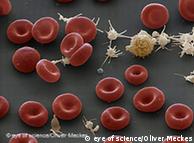Future Now finds answers to today's questions
Deutsche Welle presents 20 projects that will change our lives, and do
it soon - not in the distant future. These researchers are looking for
solutions to burning questions about the future.
Health, mobility, communications and the environment: these are
some of the key areas for science in the future. The Deutsche Welle
project "Future Now" highlights scientists in all these fields who are
seeking innovative solutions for our most pressing questions not just
theories from ivory towers.
Presented in seven languages and accompanied by multimedia features,
Future Now illustrates Germany's role in the scientific community and
its cooperation with international scientists. All the scientists
profiled in the project are working on research that will influence the
spheres of health, mobility, communication and the environment in the
future.
The future of health
There are few areas of research that are so closely connected to
people's hopes as the field of medicine. What do we know about our
genetic makeup? Can we cure deadly diseases, or at least slow their
advance?
 Red blood cells under the microscope Red blood cells under the microscope
Stem cells in China serve as a model for the development of
treatments against genetic diseases. In Munich scientists are looking
into tiny chips that could be implanted to improve cognitive skills.
Researchers in Jena and Munich work to develop efficient ways for
diagnosing Alzheimer's disease before it claims a patient's personality.
The future of mobility
As the labor market demands people relocate to wherever there's work,
the employees of the future will have to become more mobile and
flexible. Future Now shows how emissions-free airplanes and cars with a
built-in autopilot could make our lives cleaner and easier.
The future of communication
As mobile technology spreads into more and more parts of daily life,
smaller, faster and easier to use devices will become the norm. Research
underway could turn every LED light into a wireless broadband
transmitter allowing the Internet to come out of a desk lamp. Meanwhile,
organic LEDs could turn entire walls into electronic displays.
The challenge of the environment
New ideas are vital to preserving the Earth's natural resources and
ensuring that we have enough space to live healthy lives. Future Now
profiles projects that aim to solve environmental problems, including
genetically modified plants made to withstand droughts, and a biosensor
that shows people if their water is contaminated with arsenic.
Follow the links to the website below to find out more about these projects and others or join the discussion on Facebook.
Author: Judith Hartl /sms
Editor: Kristin Zeier
http://www.dw-world.de/dw/article/0,,14858748,00.html
|